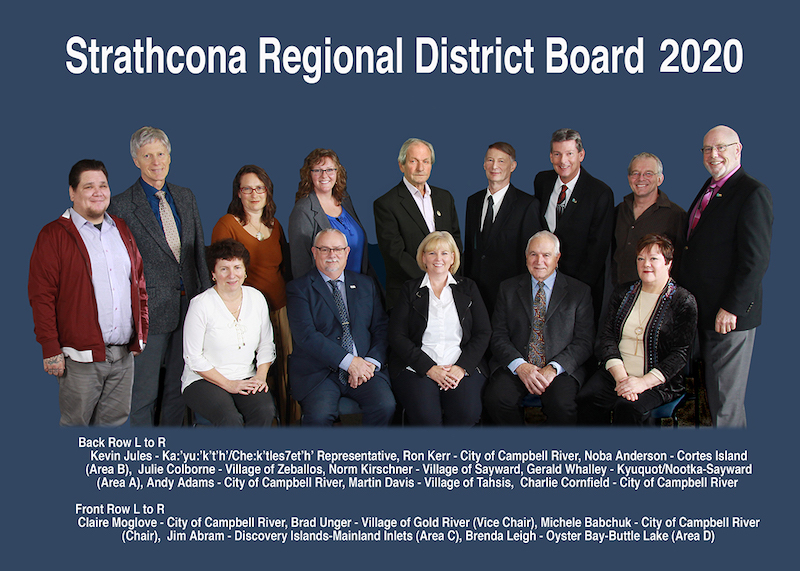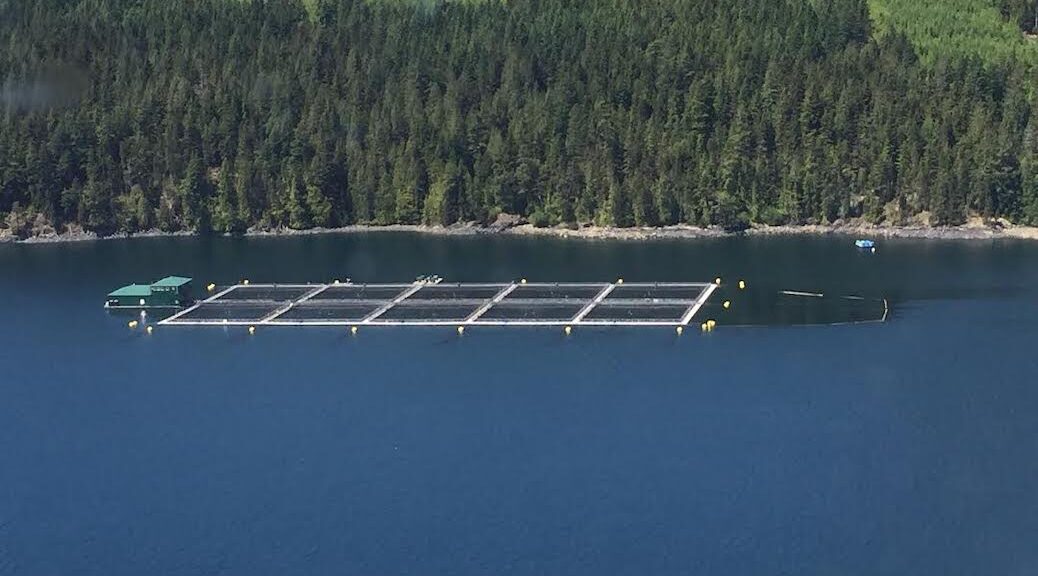The Strathcona Regional District (SRD) board has joined the growing number of local governments protesting the DFO’s failure to consult before ruling that the Discovery Island fish farms must be phased out by June 2022.
Feds do not recognize local government
Regional Director Brenda Leigh brought forward a motion that the SRD write the Prime Minister of Canada and Federal Fisheries Minister.
“Whether or not you are in favour of these particular fish farms that they are eliminating, the crux of this motion is that we were not consulted. I would like the Federal Government to consult with our Regional District since we have all these communities under our care, regarding land use decisions and we need them to listen to us. We need to tell them so that this does not keep happening. People are out there. Their lives are being decimated and they have no input into this decision that is happening right now. Our MP is talking to the Federal Fisheries Minister right now and I am afraid that we are not going to get the point of view of local communities across to the Minister,” she said.
Charlie Cornfield, who is both a Campbell River councillor and SRD director, explained, “The federal government does not recognize local government as a level of government. So … if they talk to a couple of people in town, or a couple of organizations, they’ve done their community consultation … Whatever letter goes off, I want it to be very clear that they did not have any dialogue with any local government: whether it is cities or the Regional District. The impacts of this decision are huge. We need to stress the fact that local government is the voice of the local communities.”
‘Not science’
He added that the DFO’s Discovery Islands ruling “is based on social license, not science and not even informed.”
The mayor of Campbell River made a similar statement recently, that by supporting the open net fish farm industry he was “in support of dealing with the facts of science, technology and innovation.”

A local industry
Where are they getting their information?
A quick search of the SRD minutes revealed six items from Cermaq Canada since late 2018, but none from scientists critical of fish farms.
The city of Campbell River minutes were even more revealing. There were 56 entries for MOWI Canada West, 50 for Cermaq Canada and 41 for Greg Seafood BC Ltd. By way of contrast, there are no direct communications from critics of the industry like independent biologist Alexandra Morton, Stan Proboszcz from the Watershed Watch Salmon Society or Krisiti Miller-Saunders, head of the DFO’s molecular genetics laboratory at the Pacific Biological Station in Nanaimo.
The few entries pertaining to Morton and Miller-Saunders were references to their work made by third parties.
A search for Proboszcz returned ‘no results.’
None of these scientists reside in the Strathcona Regional District.
By way of contrast, The big three fish farm companies all have headquarters in Campbell River. In addition, Grieg has a land-based freshwater hatchery in the town of Gold River and MOWI has one in Sayward.
According to a report from the BC Salmon Grower’s Association, 572 people in the Campbell River, Sayward and Discovery Island area are employed by the fish farm industry and it uses 678 local venders.
A majority of the 13 SRD directors represent areas where fish farms have a strong local presence: The mayors of Gold River and Sayward have seats. So does the mayor and four councillors from Campbell River. The mayors of these three communities have all come out in support of the industry.
Jim Abram is Regional Director for the Discovery Islands, where the fish farms are being phased out.

We have the legislated authority
One of the key points of the SRD’s motion is they represent the communities that will feel the economic and social impacts of phasing out this sector and the DFO failed to consult with them.
Abram agreed that, “Communities does not equal local government. We fight this on every table I am on. They continually call us communities. Communities are everybody, local government is specific and we have the legislated authority to do the zoning.”
Campbell River Director Colleen Evans said, “I am very concerned that we have not had interaction from the beginning with this. I think now that there is some discussion, that we include and copy our [Federal and Provincial representatives] to ensure that we are not only keeping them informed, but we are holding them accountable to respond to the information we are bringing forward.”
The Motion
The motion (Leigh/Cornfield 40/21) as it appears in the minutes of the Jan 13, 2021 Board Meeting:
“THAT the SRD write to the Prime Minister of Canada and the Federal Fisheries Minister to enquire why there has been no consultation with our Strathcona Regional District, which is responsible for zoning in our local communities and which decides location, zoning and conditions of use of fin fish aquaculture in our Region and why our expertise has been ignored. One of our concerns is that the proposal to close numerous fish farms without consultation with all of our local communities could eliminate up to 1,500 direct and indirect jobs and further harm the struggling economy on Northern Vancouver Island, and further
“THAT our MLA and MP be copied on this motion.”
The motion carried, with no opposing votes.
Links of interest
- (Cortes Currents) North Vancouver Island mayors support fish farms
- (Cortes Currents) An industry considers prospects for survival
- (Cortes Currents) Questioning the numbers – will 1,500 fish farm workers lose their jobs?
- (Cortes Currents) There will be a plan in place to address fisheries and job losses in the Discovery Islands
- (BC Salmon Farmers) Open letter to Minister Jordan: Your decision to close Discovery Island area salmon farms puts at risk 1,500 rural coastal jobs
- (Globe and Mail) Scientist at Department of Fisheries and Oceans says Ottawa is too beholden to fish farm industry
- (Cortes Currents) Closing down the Discovery Island salmon farms
- (DFO) Government of Canada moves to phase out salmon farming licences in Discovery Islands following consultations with First Nations
- (Cortes Currents) Articles about the Discovery Island salmon farms
Top photo credit: Hardewick Island fish farm, in the Discovery Islands – courtesy Ian Roberts of MOWI

This program was funded by a grant from the Community Radio Fund of Canada and the Government of Canada’s Local Journalism Initiative.


Well, I want to know how the local politicians consulted with their constituents, including First Nations, commercial wild fishers, and businesses in wild sport fishery and tourism? Or did they only listen to the fish farmers who clearly are lobbying them hard for support (‘cuz that’s how it seems…). And maybe they could reach out to other people like the scientists they say never consulted them to get another perspective before throwing their lot in with these multinational corporations.
The local politicians disgrace themselves, attacking scientists who have published their results in leading REFEREED scientific journals. A shameful performance, and an insult to scientists everywhere.
Corrupt Aquaculture Army Occupy Corporate Base In Campbell River.
No different than logging companies ripping out every last old growth forest, and never allowing the ability to witness truly natural environments, or for that matter no clean water for the fish to naturally spawn in.
Either the directors on the regional districts ignorantly don’t understand the laws of Canada and their roles under it – or they are purposely misleading the public on the laws. Either way – it is extremely unprofessional.
The Regional Districts can zone since the Province narrowly & specifically calved-off the Authority for the Provincial Lands Act to them. That’s all they can do. They are NOT holders of Rights & Titles. That’s the local FNs.
And the water column and regulation of aquaculture is federal. That authority is generated through the Constitution Act; where s.35 of that same Act codifies & confirms FN rights & title along w case law developed from it.
DFO and the feds have a fiduciary duty to consult & accommodate FNs – NOT the whiny directors on the regional district.
They have no more legal rights nor standing than any other person on the street.
Time for the directors to inform themselves on the laws of Canada – as the rest of us already have.
https://www.campbellrivermirror.com/news/aquaculture-companies-judicial-review-challenges-reconciliation-and-aborginal-rights-first-nations/
Thank you for this Dave. The author, Binny Paul, is in the Local Journalism Initiative program and as long as her article is reposted to the LJI website, Cortes Currents is free to repost it, thus http://cortescurrents.ca/first-nation-says-judicial-review-challenges-reconciliation-and-aboriginal-rights/
https://www.campbellrivermirror.com/opinion/salmon-farm-decision-did-not-come-out-of-the-blue/?mc_cid=b458fc407a&mc_eid=72b301a8fa
And why were First Nations not consulted for this group to manage our Territories? We should have Ben consulted we don’t need organization like this making decisions that will destroy a way of life we’ve protected for thousands of years.
I know there have been many, most likely hundreds, of cases when First Nations were either not consulted on matters or the ‘consultation’ was so inadequate as to meaningless.
But in this case, it was the collective First Nations opinion that decided the matter.
SRD is arguing that they should have had a seat at the table too.